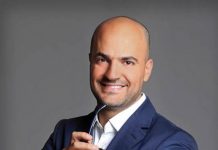In Surprise Move, Bitter Political Rivals in Lebanon Announce Deal
By ANNE BARNARDJAN. 18, 2016/New York Times
BEIRUT, Lebanon — Two of Lebanon’s most prominent Christian politicians — one a crucial political ally of Hezbollah, the other its longtime foe — struck a surprise agreement on Monday that could help end the standoff that has left the country without a president for nearly two years.
In the deal, Samir Geagea, the leader of the Lebanese Forces party, threw his support behind the presidential candidacy of his lifelong rival, Michel Aoun, whose Free Patriotic Movement is Hezbollah’s main Christian ally in Parliament.
It was a remarkable development even in the context of Lebanon’s constantly churning politics. The two men are bitter adversaries. Their militias fought bloody battles during Lebanon’s civil war a quarter-century ago, and they have been on opposite sides over the most radioactive issues in Lebanon: Israel and the war in Syria. If the deal sticks, Mr. Geagea’s move could throw the political alignments of the last decade into turmoil and strike a blow at Saad Hariri, the leader of the Future Movement, which is the largest Sunni party and the main political rival of Hezbollah, the most powerful Shiite organization.
Mr. Geagea’s party is the Future Movement’s largest Christian ally in the parliamentary bloc known as March 14. That bloc was formed to oppose the domination of Lebanon by Hezbollah’s ally, neighboring Syria, after the assassination of Mr. Hariri’s father, the former prime minister Rafik Hariri.
By siding with Mr. Aoun, long seen as Hezbollah’s candidate, Mr. Geagea is throwing into question the future of March 14 at a volatile time for the bloc.
Future is aligned with Saudi Arabia, and Hezbollah with Iran, and the relations between those regional powers are tenser than ever. Future also was an early and vociferous supporter of the uprising against President Bashar al-Assad of Syria, while Mr. Aoun sided with Hezbollah in supporting the government, which the Shiite militia is now aiding with thousands of fighters.
There was no immediate comment from Mr. Hariri, whose political standing has been under increasing strain. He remains largely in exile, while Future risks losing traction among young Lebanese Sunnis tempted by more militant groups, and Christians worry about rising radicalism in neighboring Syria.
The deal will not be final until approved by Parliament in the coming weeks, and many obstacles could still arise.
Some analysts speculated that Mr. Geagea’s move could be an attempt to better position himself for the presidency, or to get back at Mr. Hariri, who angered Mr. Geagea recently with his own surprising alliance. Mr. Hariri proposed a deal that would make him prime minister and install as president Suleiman Frangieh, a close friend of Mr. Assad and a rival of Mr. Geagea.
Mr. Geagea’s Lebanese Forces militia was Israel’s main proxy during the civil war and carried out the infamous massacre in the Sabra and Shatila Palestinian refugee camps in 1982. He is the only one of Lebanon’s major political leaders to have served time in prison for war crimes, although all sides, including Mr. Aoun’s forces, took part in atrocities.
The Christian parties hold the key to the presidency because Lebanon’s political system allocates power according to sect. The president must be a Maronite, from the country’s largest Christian denomination. But the candidate must be approved by Parliament, so he must have the backing of larger Muslim parties.
Deep divisions over the Syrian conflict, how to deal with more than one million Syrian refugees in the country and the dividing of political spoils have left the country with a presidential vacuum that has ground many government functions, shaky at the best of times, to a halt.
Citizens have long put up with rickety electrical and water systems — and widespread corruption. The latest indignity, a garbage collection crisis, has left trash piles accumulating alongside highways. Announcing his endorsement of Mr. Aoun, Mr. Geagea said he hoped the initiative would “move the country out of the current phase it is in to one that is better,” a goal that arguably sets the bar low.
*Hwaida Saad contributed reporting.
Aoun-Geagea/Words are seldom enough
The Daily Star/Jan. 19, 2016
Lebanese Forces leader Samir Geagea’s endorsement of Free Patriotic Movement chief Michel Aoun as president Monday was a milestone on two levels: one for Christians, the other Lebanese in general.
The good news is that any agreement between two once implacable foes is a move that should be commended, regardless of who they are. And former Prime Minister Saad Hariri’s initiative backing Sleiman Frangieh for the presidency was the first step in the direction that this entente is heading.
Monday’s event was an awakening for Lebanon’s Christians, a community whose divisions have threatened its clout, power and influence in Lebanon’s political scene. Geagea and Aoun’s coming together will go a long way toward healing the rifts that keep the community apart.
But although the presidency is reserved for Maronite Christians, whoever takes the role must remember that they represent all the nation’s sects, people and political parties. All of these segments will need to be on board for a candidate to fill the presidency.
And it is worth noting that the election of Lebanon’s president has seldom been a solely Lebanese affair – something to keep in mind while the region is so volatile and divided.
Many of the concerns Geagea raised while endorsing Aoun will ring true for many Lebanese. The implementation of these, however, is far from easy and clear, and only consensus can lead us there.
Indeed, Aoun’s presidency is far from confirmed, and though this endorsement greatly fosters his chances, only Parliament has the power to vote him in.
Only the coming days will show if this body, which represents all Lebanese society and sects, can agree on the LF and FPM leaders’ vision of Lebanon’s future.



















